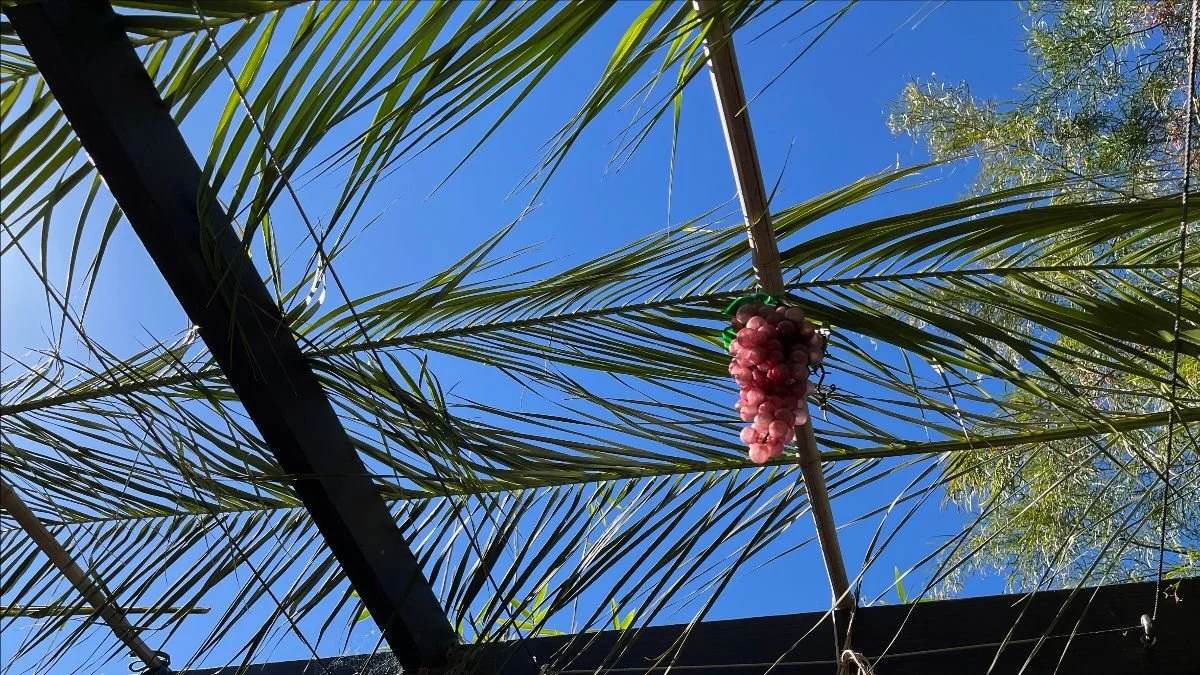Today we enter the sixth day of Sukkot, a week-long festival where we are instructed to dwell in temporary huts. Sukkot has many names, including ‘Time of our Joy’, Zman Simchateinu/ זְמַן שִׂמְחָתֵנוּ. In these days between the beginning and end of the holiday, we greet one another with the words ‘Moadim L’Simcha'/מועדים לשמחה.
I’m struggling with the idea of this time as a season of joy, because of what is happening in the world and also in my life. These days of Sukkot have brought me to unexpected turns, activities and places, including caring for a beloved family member who has been critically ill. In this season I also observe the yahrzeit of my beloved mother, who left this world during Sukkot, and of one of my beloved pets, who left us just after this holiday last year.
Our body is a sukkah, a temporary dwelling place for our soul. As I have watched the bodies of my loved ones change, break down, and even expire over the years, I am acutely aware that this is what it means to be a living being, a nefesh chayya, נֶ֥פֶשׁ חַיָּֽה, in this world. This life is temporary, arriving with our first breath and leaving us with our last.
And so, this Sukkot, I am acutely aware of the impermanence of life. Each morning as I sit under the curly willow in my yard, I observe my body, my breath, my feelings as they present themselves. Each day the inner conditions of my being and the outer conditions of my environment change. The juxtaposition of that which is eternal against that which is temporary is what it means to be alive.
The sukkah at the synagogue of my childhood was enormous. It filled an entire courtyard and we would run from end to end. It enclosed a great amount of space, an expanse, protected and contained, with the capacity to hold so much. And so this season, I have taken that image of the expanded sukkah as my own being, practicing every day to cultivate greater capacity, a larger space inside myself, in order to support my family during this difficult time, to support my students in my teachings, and to support myself from within.
What if we could expand the sukkah of our being to hold and embrace all that is within? I look to the willow tree branches above my head, the fences, and surrounding plant life in my yard as an expanded sukkah. I look to the teachings from our tradition as a sukkah of inspiration, protection and support - including an idea from the Sefat Emet that Sukkot is the time when we rest into our relationship with Divinity as the true constant source of support for our lives. I look to my practices for cultivating more spaciousness inside my heart. How can I rest into the temporary structures, shapes, and movements of my body, as a sukkah, a place of temporary comfort and reliability when life is so challenging?
Our sages teach that the four species of this holiday represent parts of the body. Our eyes are the myrtle, our lips are the willow, our heart is the etrog, and our spines are the palm branch of the lulav -flexible, curved, beautifully constructed with unique measurements of the vertebrae and spaces between, nerves and spinal fluid within. In my own practices, I also see new sukkah connections to our embodied awareness.
The openings in the coverings above and around the Sukkah are our eyes, as gateways that invite guests (both earthly and celestial) inside, and as gateways to remind us to bring forth to the outside world all that we have gathered and gleaned in the Days of Awe. The s'chach is our ribs, with spaces between the palm frond leaves mirroring the spaces between our ribs that allow for expansion and contraction when we breathe. The inner space of the sukkah is our heart, our songs, our stories, our shared times together as we bless, eat, sit, celebrate, and yes, even sing if we can, in these times.
The word ‘simcha’ also meant 'acceptance' in ancient times, according to archeological studies of ancient Middle Eastern property contracts. As I practice, I lean into the structures of my spine, rib basket, and into familiar sequences of postures and shapes as a resting place for accepting my broken heart. And this year, I must expand my heart more than ever, filling the entire space inside my body, imagining my being as large as the sukkah of my childhood, so that I can embrace the heartbreak of this season.
This Simchat Torah, may we create a space in the sukkah of our beings for acceptance, awe, hope, and gratitude for this moment, this breath, this body, this heart, this life, even as we continue to mourn, despair, pray and take action for peace and justice in this world.
נִשְׁמַת כָּל חַי
תְּבָרֵךְ אֶת שִׁמְךָ
יְהֹוָה אֱלֹהֵינוּ
Nishmat Kol Chai
T'varech et Shemcha
Adonai Eloheinu
The breath of all life sings praises to Your Name
Source of all life, Our Divine Creator
